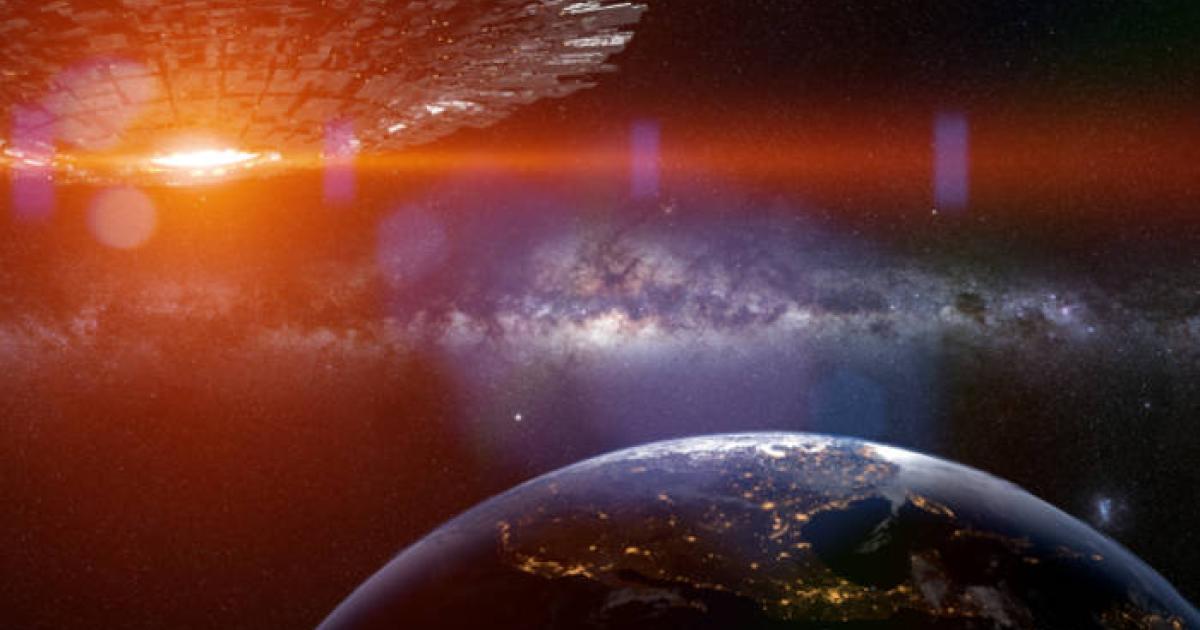Science
Scientists Suggest Earth’s Life May Result from Alien Terraforming

A recent study has ignited debate within the scientific community by proposing that life on Earth may not solely be the product of natural processes. Instead, it suggests the possibility of deliberate terraforming by advanced extraterrestrial civilizations. Conducted by Professor Robert Endres from Imperial College London, the research applies innovative information theory and artificial intelligence models, arguing that the likelihood of life arising spontaneously from random chemical processes is extraordinarily low.
The study, titled “The Unreasonable Likelihood of Being: Origin of Life, Terraforming, and AI,” utilizes complex mathematical frameworks to challenge long-held views about the origins of life on our planet. Endres posits that the formation of a viable protocell within the time available on Earth would require a level of persistence over geological timescales that seems implausible.
Mathematical Analysis of Life’s Origins
Endres employs a novel approach rooted in Kolmogorov complexity to gauge the informational requirements for life’s emergence. His findings indicate that a minimal protocell necessitates around one billion bits of organized information, comparable to the complexity found in advanced computer programs. When this is weighed against the estimated entropy of prebiotic environments, the results suggest a daunting scenario.
“A purely random soup, made up of molecules that eventually enabled the formation of life on Earth, was too lossy,” Endres notes in his paper, which is currently undergoing peer review. The research implies that a sustained directional process, lasting hundreds of millions of years, would be crucial for naturally accumulating enough biological information.
Endres draws intriguing parallels between ancient and modern scientific theories. He highlights ongoing discussions about the potential for terraforming Mars and Venus by humanity. The hypothesis asserts, “If advanced civilizations exist, it is not implausible they might attempt similar interventions out of curiosity, necessity, or design.”
Historical Context of Directed Panspermia
The idea of directed panspermia is not entirely new. In 1973, notable figures such as Francis Crick, co-discoverer of DNA’s structure, and chemist Leslie Orgel proposed that advanced extraterrestrial civilizations might have intentionally seeded Earth with microbial life to kickstart biological evolution. Their theory arose from recognizing the same statistical improbabilities that underpin Endres’ contemporary analysis.
Even with the limited understanding of the 1970s, the challenges surrounding abiogenesis appeared formidable. Crick and Orgel’s proposal offered a compelling solution, shifting the explanatory burden to more advanced civilizations operating under conditions beyond current human comprehension.
Throughout history, various cultures have harbored myths about divine or celestial beings bestowing life upon Earth. These narratives range from the biblical Book of Genesis to ancient Mesopotamian texts portraying sky gods. Modern directed panspermia theories align scientific inquiry with these long-standing human curiosities regarding external origins of terrestrial life.
Endres’ calculations emphasize staggering temporal requirements for natural abiogenesis. His models indicate that, without a consistent directional influence, random molecular assembly would require timeframes vastly exceeding the age of the universe. Even under optimistic assumptions about chemical environments and molecular stability, the informational bottleneck remains severe.
The research draws on principles from bacterial chemotaxis, where organisms display “run-and-tumble” behavior, to theorize how chemical evolution might accumulate biological information. If molecular interactions proceed as random walks without any persistent memory, the time required for assembly becomes cosmologically implausible. “With a persistence time of one year, the required time is still approximately 10^17 years, about ten million times the universe’s current age,” Endres states.
The Role of AI in Researching Life’s Origins
Endres’ study also integrates advanced artificial intelligence tools, including the AlphaFold protein folding algorithm and comprehensive whole-cell computational models, allowing for unprecedented precision in assessing the complexity of biological systems.
While Endres acknowledges that invoking extraterrestrial terraforming may seem to contravene Occam’s razor by introducing additional complexity, he argues that the mathematical constraints surrounding natural abiogenesis necessitate the exploration of alternatives often dismissed as mere science fiction.
This research marks a significant intersection among astrobiology, information theory, and artificial intelligence. As computational models evolve, scientists may achieve greater accuracy in quantifying the complexity of life, potentially shedding light on longstanding debates regarding its origins.
The question of whether Earth’s biosphere developed through undiscovered physical principles, highly improbable natural processes, or deliberate extraterrestrial intervention remains unresolved. Nonetheless, Endres’ work illustrates the importance of investigating unconventional possibilities when conventional explanations face mathematical challenges.
The implications of this study extend beyond academic curiosity, prompting a reconsideration of humanity’s place in the cosmos and the potential for life beyond Earth.
-

 Top Stories5 days ago
Top Stories5 days agoTributes Surge for 9-Year-Old Leon Briody After Cancer Battle
-

 Entertainment2 months ago
Entertainment2 months agoAimee Osbourne Joins Family for Emotional Tribute to Ozzy
-

 Politics2 months ago
Politics2 months agoDanny Healy-Rae Considers Complaint After Altercation with Garda
-

 Top Stories4 days ago
Top Stories4 days agoNewcastle West Woman Patricia Foley Found Safe After Urgent Search
-

 Top Stories1 month ago
Top Stories1 month agoIreland Enjoys Summer Heat as Hurricane Erin Approaches Atlantic
-

 World2 months ago
World2 months agoHawaii Commemorates 80 Years Since Hiroshima Bombing with Ceremony
-

 Top Stories2 months ago
Top Stories2 months agoFianna Fáil TDs Urgently Consider Maire Geoghegan-Quinn for Presidency
-

 World2 months ago
World2 months agoGaza Aid Distribution Tragedy: 20 Killed Amid Ongoing Violence
-

 World2 months ago
World2 months agoCouple Convicted of Murdering Two-Year-Old Grandson in Wales
-

 Top Stories2 months ago
Top Stories2 months agoClashes Erupt Between Far-Right Groups and Migrants in Spain
-

 World2 months ago
World2 months agoAristocrat Constance Marten and Partner Convicted of Infant Murder
-

 Top Stories4 days ago
Top Stories4 days agoPatrick Kielty Returns to Late Late Show, Thanks Supporters









